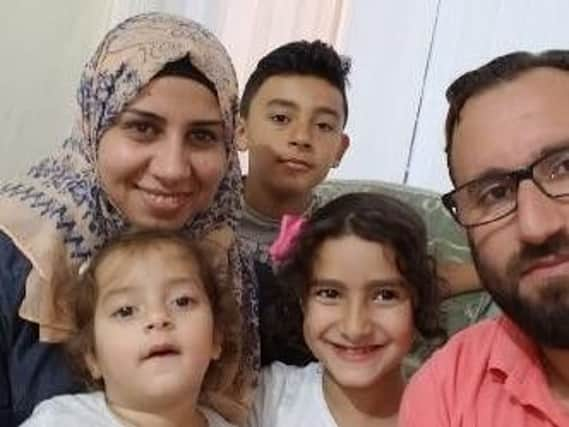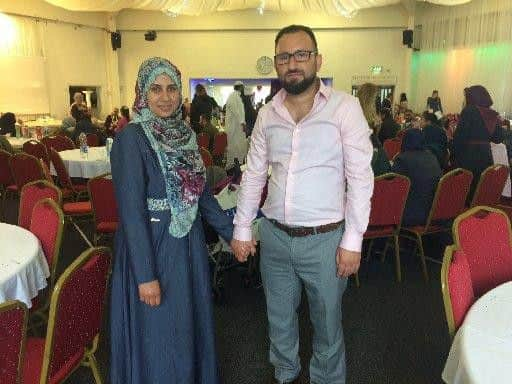Syrian refugee family in Lancashire say 'Thank you for welcoming us'


They travelled all the way from Daraa to Preston then on to Blackpool with their three children – one boy, Noor, who is four, and two girls Dana, seven, and Meral, two.
Ahmad, 40, who is on the hunt for work in the UK, says words cannot describe the horrors of the violence he and his family have managed to escape.
Advertisement
Hide AdAdvertisement
Hide Ad“You can’t imagine what is happening in Syria,” he said. “I think that all Hollywood can’t make a film about it.


“It is horrific – like hell.
“In my village they took a woman. They took her by her hair and burned her alive.
“You can’t get school for your children because then they drop a bomb on your school. They destroy any kind of life in Syria – even the cats are killed.
“Sometimes the people there eat cats, they eat grass. People died from starvation. There is no water, no food.”
Advertisement
Hide AdAdvertisement
Hide AdAhmad says that just going to work was a trip fraught with anxiety for him and his family. He never knew if he would be picked up and thrown into jail, for no reason and with no way to get word back to his wife.
He said: “I was working with an agricultural company and I was going to the store to pick up some agricultural material to take back to my shop. That’s when the armed forces took me from the street.
“Any time I go to my job the army could take me just because.
“If a soldier looks at you and doesn’t like you he will take you to jail.
Advertisement
Hide AdAdvertisement
Hide Ad“They had me in jail for two weeks. There were 60 people in one small room. You can’t eat or sleep. You have to try and sleep while you are standing. If you can get a little space you are lucky. There was no food – we only had a little meal once a day and we had to share one or two litres of water between 15 people.”
Malak’s father was also taken and thrown into jail a total of four times.
“One time they took him from the house before sunrise,” said Malak. “They broke the gate and took him.”
Asked why her father was taken Malak said: “Who knows.”
One one occasion, Malak’s father was held in prison for two months, on another occasion it was for 48 days.
Advertisement
Hide AdAdvertisement
Hide Ad“The last time they took him it was for about four months,” said Malak. “We didn’t know where he was. He’s an old man – in his 50s.”
Malak said: “My brother was a student at university in Damascus studying medicine. They took him to jail and his future was destroyed.
“He’s now a refugee in France. One of my sisters also arrived in France two weeks ago.”
Both of their families have seen tragedies.
“I have family everywhere and some of them are in the grave,” said Ahmed.
Advertisement
Hide AdAdvertisement
Hide Ad“My mum died while I was in Jordan and I couldn’t see her. Another two brothers died in Syria and I can’t hear their voices anymore.
“I wish to have grave one metre from my family members in the future - where I grew up, where I ate, where I played games.”
One of Ahmad’s brothers is now in Germany working as a local journalist.
He said: “In Syria he was studying Arabic at university. He has suffered illness because there was no medication in Syria.
Advertisement
Hide AdAdvertisement
Hide Ad“There isn’t any medication or hospitals – only in Assad’s areas and you can’t go there because if you go there they take you to jail or they kill you.”
It took Ahmad, Malak and their children three attempts before they were able to leave Syria.
Each time bombs and rockets hampered their escape but eventually they were able to travel to a refugee camp in Jordan by land.
Ahmad and Malak spent four years in the camp in Jordan before they were able to come to the UK.
Advertisement
Hide AdAdvertisement
Hide AdMalak’s parents is still in Jordan along with two of her brothers. “I miss them,” she said. “I want to get them here. The life is very difficult in Jordan.”
Ahmad said: “Because you are a refugee you can’t work in Jordan. You can’t act like the son of the country. You can’t make anything.
“If you go out at night you might get stopped by the police and who ask who you are and you have to show your ID.”
Being able to reach the UK is a huge relief to Ahmad and Malak, who were granted leave to move to Blackpool through official routes with the UN.
Advertisement
Hide AdAdvertisement
Hide Ad“It is an amazing opportunity for Syrian families,” said Malak. “The language is hard but we are looking for any jobs.
“I was just thinking about a new life. I was praying please gave me a new life. I was very happy when we came here.
“At first when I saw my house I needed to go back because all the things were different.
“But I felt different after that and after I started to work and learn English I felt better.
Advertisement
Hide AdAdvertisement
Hide Ad“When I was in Jordan my daughter was not even able to go to school.”
Now Noor and Dana are both in school in Blackpool and their parents are very pleased that they are getting stars from their teachers.
“All of the teachers say Noor is very gentle and clever,” said Malak.
The conflict in Syria
Conflict and displacement are intensifying in northwest Syria. Some 212,000 people have fled their homes since mid-December 2017. Most internally displaced people are living in makeshift shelters with little access to aid. Eastern Ghouta, near Damascus, is another area of intense fighting unreached by aid.
Advertisement
Hide AdAdvertisement
Hide AdThe city of Raqqa, ISIL’s former stronghold in Syria, was retaken in October 2017. Much of the area is still contaminated by explosives and, therefore, not safe for families to return home.
In 2017, 74 cases of polio were detected in Syria, which was polio-free before the civil war.
Before the civil war, Aleppo was a financial and industrial centre and Syria’s largest city. Now it is reduced to the second-largest city in Syria and recognized as the worst-hit during the Syrian civil war.
An estimated 13.1 million people in Syria need humanitarian assistance as a result of the civil war that began in 2011.
Advertisement
Hide AdAdvertisement
Hide AdThe Syrian civil war began in March 2011. It broke out after a forceful crackdown on peaceful student protests against the government of Bashar al-Assad.
Hopes of Arab Spring reforms were dashed by armed repression. The conflict has continued and accelerated as government troops, armed rebels, and external forces clashed, taking territory from each other, vying to hold onto it.